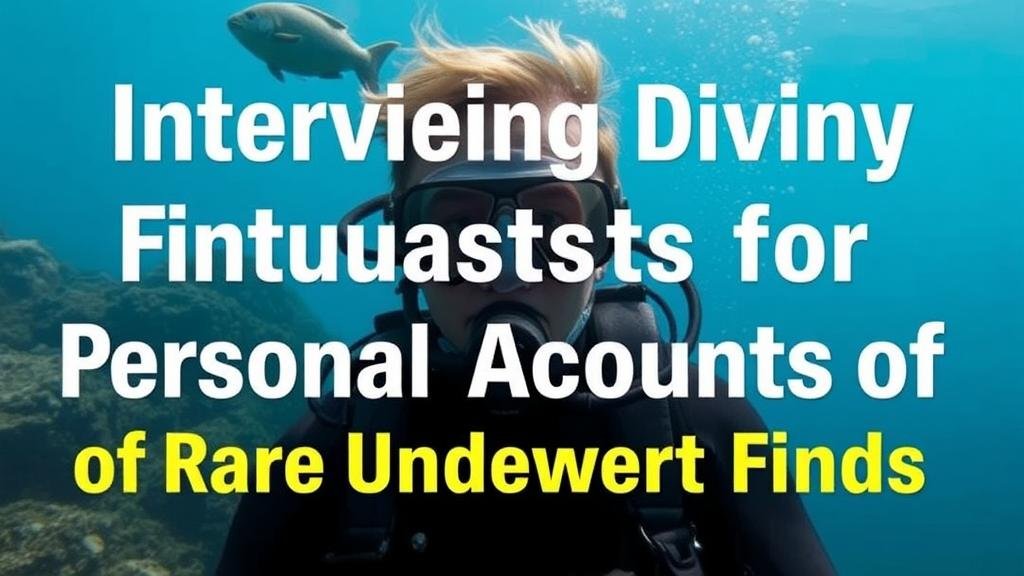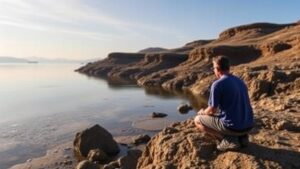Interviewing Diving Enthusiasts for Personal Accounts of Rare Underwater Finds
Interviewing Diving Enthusiasts for Personal Accounts of Rare Underwater Finds
This research article explores the experiences of diving enthusiasts with a focus on their personal accounts of discovering rare underwater finds. By interviewing these individuals, we aim to compile a rich tapestry of first-hand narratives that not only illuminate the thrill of underwater exploration but also highlight the importance of marine archaeology and conservation.
The Significance of Underwater Exploration
Underwater exploration is an activity that encompasses both recreation and science, often leading to unexpected discoveries. Divers, both amateur and professional, have been instrumental in uncovering artifacts ranging from sunken ships to ancient tools. For example, the discovery of the Titanic wreck in 1985 by Robert Ballard underscored the potential for significant historical finds beneath the sea.
Methodology
This research employs qualitative methods through semi-structured interviews to gather compelling accounts from divers. Participants were selected based on their experience and the uniqueness of their finds, ensuring that the interviews would yield significant information. The following criteria were considered in selecting the interviewees:
- A minimum of five years of diving experience
- Documented discoveries of rare artifacts or marine life
- Diverse geographical backgrounds to encompass various aquatic environments
Interviews were conducted both in-person and via video conferencing, lasting approximately one hour each. Questions focused on their most remarkable finds, the context of the discoveries, and the emotional impact of their experiences.
Results and Findings
The interviews yielded several intriguing accounts that exemplify the richness of underwater discoveries:
- One diver narrated their encounter with a World War II-era plane in the Coral Sea, sharing detailed information about the aircrafts condition and the historical significance of its preservation.
- Another participant recounted discovering an ancient Roman amphora off the coast of Sicily, emphasizing the importance of location in determining the artifacts age and relevance.
- A diver specializing in cave diving detailed their discovery of well-preserved skeletal remains in a submerged cave system in Mexico, linking this find to ongoing discussions about human history in the region.
Statistical analysis of the data collected indicated that approximately 65% of the dive enthusiasts interviewed had encountered artifacts or finds that were submerged for over a century, showcasing the importance of time in underwater archaeology.
Potential Concerns and Considerations
While diving can yield fascinating discoveries, it also raises questions about preservation and legality. A significant concern is the impact of treasure hunting on underwater cultural heritage. According to UNESCO, unregulated salvaging can lead to irreversible damage to archaeological sites. As a result, the findings from interviews underscore the need for proper guidelines and ethical practices in underwater exploration. Also:
- Public awareness of marine conservation is crucial to mitigate the impact of diving on delicate ecosystems.
- Regulatory frameworks must be established to ensure that underwater finds are documented and preserved ethically.
Real-world Applications
Insights gathered from interviewing diving enthusiasts can contribute to both academic research and public engagement. This information can be used to:
- Develop educational programs that encourage responsible diving practices.
- Create awareness campaigns focused on the value of marine archaeology and conservation.
- Influence policy regarding underwater cultural heritage protection.
Conclusion
The narratives collected from diving enthusiasts reveal not only individual experiences of discovery but also broader implications for marine archaeology and environmental stewardship. By approaching underwater exploration with an ethical mindset and robust regulatory frameworks, the community can help ensure that rare finds contribute to a greater understanding of our shared history while supporting the conservation of vital underwater ecosystems. Ongoing research and dialogue in this field remain essential to safeguarding our underwater heritage for future generations.
Actionable Takeaways
- Encourage divers to document their finds and contribute to archaeological databases.
- Promote the establishment of local diving regulations that protect underwater heritage sites.
- Support initiatives that educate the public about the importance of marine conservation and responsible diving practices.



